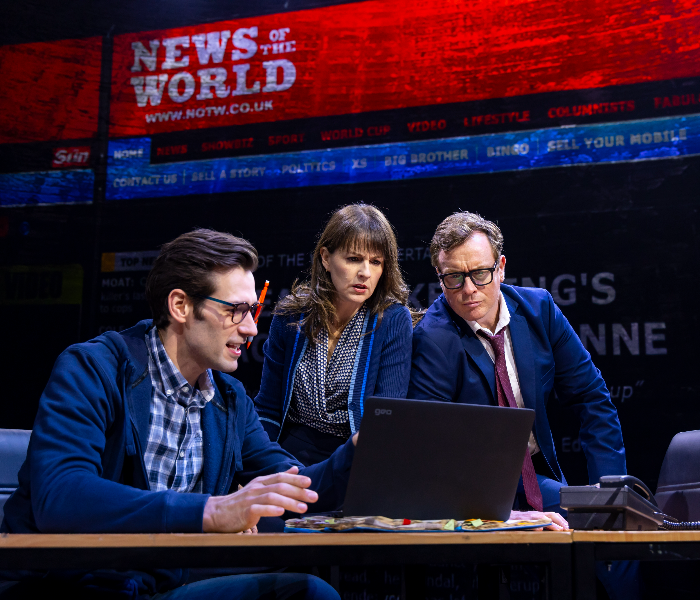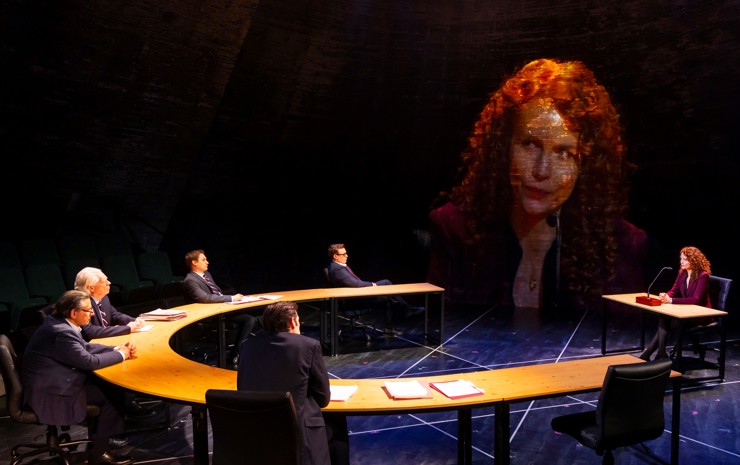Translate Page

John Behlmann, Eleanor Handley and Toby Stephens in Corruption at Lincoln Center Theater. Photo by T. Charles Erickson.
The team behind the Tony-winning Oslo reunite for a new history-inspired play about the British phone-hacking scandal
---
J.T. Rogers' Corruption, which is having its world premiere at Lincoln Center Theater's Mitzi E. Newhouse Theater, feels like a heady mix of All the President's Men and a Shakespeare history play. Based on Dial M for Murdoch: News Corporation and the Corruption of Britain, cowritten by English politician Tom Watson and journalist Martin Hickman, the drama chronicles the uncovering of the sensational phone-hacking scandal that rocked Britain a decade ago. Bartlett Sher, who directed the playwright's Tony-winning Oslo, helms this new work, which is framed as a David-and-Goliath-style confrontation with the parliamentarian Watson (Toby Stephens) and his allies pitted against the might of Rupert Murdoch's media empire, embodied by then CEO of News International, Rebekah Brooks (Saffron Burrows).
TDF Stages chatted with Rogers and Sher about their fruitful collaboration, the challenges of translating such a dense story to the stage and why this British tale has a disquieting relevance for audiences on this side of the pond.
Gerard Raymond: J.T., what made you want to adapt Dial M for Murdoch for the stage?
J.T. Rogers: It's the kind of story that I am always pulled to. It's about private individuals, huge political and moral stakes, and skullduggery. It asks epic questions: What is democracy in the face of the swamping power of media? And who gets to decide our future and create the narrative of who we are? The play is a work of historical fiction, not a documentary. But I feel I have an obligation to not have anyone say anything that is intellectually the opposite of what they would say. The book was the starting point. But really, [the play came from] the interviews with the people therein, including the authors, transcripts from the House of Commons, from the newspapers and video interviews. We are a fact-obsessed world—especially in this moment when we're trying to debate what facts are—but there's a truth and an essence about reality that fictional playwriting can do best.
Raymond: Is it true that you had to operate undercover when initially doing research for the project?
Rogers: Yes. I mean, I want to make sure I don't paint myself as Sam Spade or James Bond. But the book Dial M for Murdoch had just come out [in 2012] and it was at the height of the power in Britain of the Murdoch press. People were actually frightened of the might of News International and the legally documented use of that power by Rebekah Brooks and the people who worked for her. The sort of feverish desire to pull down this malevolent force and this anxiety made me incredibly paranoid and stressed, which I didn't enjoy. But I thought, oh, this is good for the work! So, I asked the little hotel where I was staying if they could bring a safe so I could lock my notes up. I'm not sure whether I was overreacting or not, but these people felt they were risking their lives—their careers for sure. They had some cojones. And they were very complicated people themselves, not all white knights.
Raymond: I read you put the play aside while you and Bart worked on Oslo, and then you spent a few years in Japan making the series Tokyo Vice. How did Corruption eventually come together?
Rogers: Bart called me while I was in Japan and said that he thought it was time, and that there was a slot in the theatre. Returning to the story was both illuminating and unnerving because times have continued to change so rapidly. I had been interested in telling this specific story about a specific scandal in a specific country. Without those details changing, all of a sudden, it now feels like it's actually about what is happening in our country.
Raymond: It almost seems like the events of the play were a rehearsal for America.
Bartlett Sher: I think you're right—it was a dry run for what was ahead. The way in which journalism was practiced in the UK was just the beginning of how we get manipulated. We used to have a shared narrative about what it meant to be American or what democracy meant. Now it's all up for grabs, and it can be diluted through various means if you go down the wrong rabbit hole.
Raymond: This is your third collaboration following two other productions at Lincoln Center: Blood and Gifts and Oslo, which you also turned into a movie. Why do you work so well together?
Rogers: Overlapping sensibilities but different sensitivities and talents.
Sher: J.T. has an extraordinarily unique gift for dramatizing complex world events and great human events on stage. I have very strict rules about my relationship to any great playwright. It's my job to let him create, build what he builds, then I find a way to do it. But you can only do that with somebody gifted enough to have their own sensibility, their own point of view, their own way of developing stuff. I'm just lucky to be able to [work with someone] who wants to take on a lot of the same things I love to take on: politics and ideas and human experience and who we are and intersect them all in the world of drama.
Raymond: Can you talk about the kinetic feel of the show, which is unlike your past productions?
Sher: The way I try to describe it, it's like seeing a six-part Netflix series in one night. We disagree about this, but it's over 85 scenes…
Rogers: The reason we disagree goes back to your question about what we see in each other. The thing about Bart is there is no one who stages plays better in American theatre. So, it's a challenge to me. If he can do anything, then how am I gonna push myself? So, purposely, there are no scene delineations because if the numbers were there, people would freak.
Sher: It's constantly changing, moving from place to place. And that's fun. There are also 13 actors playing over 50 roles. I use projections and there are full banks of TVs like you would find in a television studio or a newsroom. Plus, there's what I call 21st-century acting, where you're doing a scene and you're texting, or you might be tweeting at the same time. So, you're actually acting on three or four levels at once. It creates this kind of world which is constantly shifting. I think because of phones, etc., audiences can track a lot happening at one time. I've been pushing myself to explore these other mediums as they intersect with language. So, you get a feast of epic political drama exercised in a variety of ways and mediums.
Rogers: I think he's really onto something. That's one of the things about having a good collaborator. When you return to work together, you consciously or unconsciously do not repeat what you've done but build on it. We'll be in the rehearsal room and have all these incredibly complicated short scenes and Bart will be like, "Why don't we just take these two scenes and have them performed at the same time?"

Raymond: J.T., did working on Tokyo Vice influence your writing of the play?
Rogers: What I learned in making 18 hours of Tokyo Vice is a compression of information and a fluidity and a rapidity. You can still have depth and complexity but pull the audience in at a pace that I didn't think possible or, perhaps, didn't have the skill for yet. In this particular show, the parts that I'm most excited about come from those muscles.
Sher: This is a very difficult story to tell—especially when you're dealing with a group of people where there's no evidence of what's going on and you need to have every line checked by lawyers.
Raymond: You've assembled quite a cast for this production, notably Toby Stephens as Tom Watson and Saffron Burrows as Rebekah Brooks alongside an exciting mix of actors from both sides of the Atlantic.
Sher: Toby is really our mainstay. He really is holding the company together; he has to do so much. And then we were really lucky with Saffron Burrows, who is English but lives in Los Angeles. That's a very difficult part because despite all the things you think she did, the person everybody meets is charming and incredibly winning. What she accomplished is very hard to measure. It's a great company.
Rogers: Bart has a particular ability, sort of a strange alchemy. He always builds a company that thrives on the act of making theatre. And he has an extraordinary egalitarian approach to directing, which I think has only increased as we work together. It's sort of an unwritten rule: The best idea wins—it doesn't have to be mine.
Sher: That's because I don't believe in directing as the pursuit of an individual genius. I think theatre is the rallying of collective genius.
This interview has been lightly edited for length and clarity.
---
Corruption is frequently available at our TKTS Discount Booths.
TDF MEMBERS: Go here to browse our latest discounts for dance, theatre and concerts.